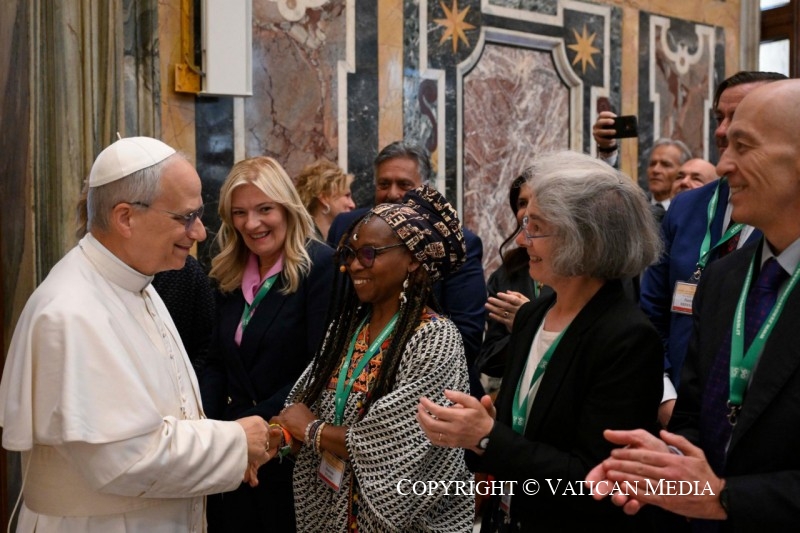Leo XIV: “The Church does not wave the flag of possessing the Truth”
Receiving the Centesimus Annus Foundation in audience, the pope outlined the meaning of the social magisterium in the context of the many challenges in today's world. “Doctrine is not the opposite of dialogue. There is no doctrine without closeness to people and to situations. Indoctrination that prevents critical judgment is immoral. I urge you to give voice to the poor.”
Vatican City (AsiaNews) – Addressing the Centesimus Annus Foundation in a recent audience, Pope Leo XIV laid out the meaning of the Church’s social teaching in light of today’s many global challenges. “Doctrine is not the opposite of dialogue,” he said. “There is no doctrine without closeness to people and their situations. Indoctrination that blocks critical thinking is immoral. I urge you to give voice to the poor.”
Regarding the problems of our time, the Church “does not want to wave the flag of possessing the truth,” the pope said. It recognizes the importance of “critical thinking” and is called to remember that the primary task of doctrine is to teach us “how to approach situations—and even more so, people.”
This significant statement was made during an audience with the Centesimus Annus Pro Pontifice Foundation, a Vatican organization dedicated to promoting the study and understanding of the Church’s social magisterium. The foundation is currently hosting a conference on the theme: “Overcoming Polarization and Rebuilding Global Governance: Ethical Foundations.”
In his speech, Pope Leo XIV recalled the words he spoke the evening of his election: an appeal “to build bridges—through dialogue, through encounter—joining together to be one people always at peace.” “This doesn’t happen spontaneously,” he commented, “it’s a dynamic and ongoing interplay of grace and freedom, which we are strengthening even now in this meeting.”
In the “dramatic historical moment we are living in,” where “wars, climate change, increasing inequality, forced and opposed migrations, stigmatized poverty, disruptive technological innovations, and precarious labor and rights” all converge, “the Church’s Social Doctrine is called to provide interpretative tools that foster dialogue between science and conscience, thus offering a fundamental contribution to knowledge, hope, and peace.”
The pope emphasized that the Church “does not claim to possess the truth,” either in analyzing or solving these issues. “In such matters, what matters more is the ability to draw close, rather than to provide a rushed answer as to why something happened or how to fix it. The goal is to learn how to face problems, which are always new, because every generation is new—with new challenges, dreams, and questions.”
“For many people today,” he continued, “the words ‘dialogue’ and ‘doctrine’ sound like opposites, incompatible. When we hear the word ‘doctrine,’ we may think of the traditional definition: a set of ideas belonging to a religion. And with that definition, we might feel little freedom to reflect, question, or explore alternatives.” But true doctrine, the pope explained, is synonymous with “science,” “discipline,” or “knowledge.” “Understood this way,” Leo XIV said, “doctrine is the result of research, and therefore of hypotheses, voices, progress and failures—through which it seeks to convey reliable, orderly, and systematic knowledge on a given issue. Thus, doctrine is not an opinion, but a shared, collective, even interdisciplinary path toward truth.”
“Indoctrination is immoral,” he said. “It prevents critical judgment, it violates the sacred freedom of conscience—even if erroneous—and it rejects new reflections by refusing movement, change, or the evolution of ideas in the face of new problems. On the contrary, doctrine, when serious, calm, and rigorous, aims first and foremost to teach us how to approach situations, and especially people. It also helps us formulate prudent judgment. Seriousness, rigor, and calm are what we must learn from every doctrine, including the Church’s Social Doctrine.”
In the context of the ongoing digital revolution, the pope stressed the importance of “education in critical thinking,” which “must be rediscovered, made explicit, and nurtured—countering opposing temptations that can even affect the Church itself.” “There is little dialogue around us,” he said. “Instead, loud voices prevail—often fake news and irrational claims from a few domineering figures. That’s why deep reflection and study are essential—as are encounter and listening to the poor, who are a treasure of the Church and of humanity. They carry viewpoints that are often discarded but are essential to seeing the world through God's eyes. Those who are born and grow up far from centers of power must not simply be instructed in Catholic Social Doctrine—they must be recognized as its continuers and renewers: witnesses of social commitment, popular movements, and various Catholic workers’ organizations are expressions of the existential peripheries in which hope endures and always blossoms. I urge you: give voice to the poor.”
“There is today a widespread need for justice,” Pope Leo concluded, “a longing for fatherhood and motherhood, a deep desire for spirituality—especially among young people and the marginalized, who do not always find effective ways to express themselves. There is a growing demand for the Church’s Social Doctrine to which we must respond.”







.png)










